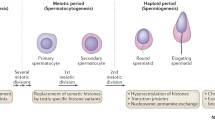Abstract
Our daily food, especially vitamins of the B-family and secondary plant metabolites, have the potential to modify epigenetic signatures, which are located on both our DNA and associated histones. These bioactive substances play an important role in activating and silencing gene expression and, therefore, represent a bridge between nutrition and health. Modified epigenetic signatures in our germ cells, e. g. caused by obesity, may even be inherited to our children and grandchildren and have the potential to affect health in their later life.
Similar content being viewed by others
Literatur
Lambrot R, Xu C, Saint-Phar S et al. (2013) Low paternal dietary folate alters the mouse sperm epigenome and is associated with negative pregnancy outcomes. Nat Commun 4:2889
Soubry A, Schildkraut JM, Murtha A et al. (2013) Paternal obesity is associated with IGF2 hypomethylation in newborns: results from a Newborn Epigenetics Study (NEST) cohort. BMC Med 6:11–29
Schagdarsurengin U, Paradowska A, Steger K (2012) Analysing the sperm epigenome: roles in early embryogenesis and assisted reproduction. Nat Rev Urol 9:609–619
Luense LJ, Wang X, Schon SB et al. (2016) Comprehensive analysis of histone post-translational modifications in mouse and human male germ cells. Epigenetics Chromatin 21:9–24
Schagdarsurengin U, Steger K (2016) Epigenetics in male reproduction: effect of paternal diet on sperm quality and offspring health. Nat Rev Urol 13:584–895
Ribas-Maynou J, Benet J (2019) Single and double strand sperm DNA damage: different reproductive effects on male fertility. Genes 10, doi: 10.3390/genes10020105
Campbell JM, Lane M, Owens JA et al. (2015) Paternal obesity negatively affects male fertility and assisted reproduction outcomes: a systematic review and metaanalysis. Reprod Biomed Online 31:593–604
Ahmadi S, Bashiri R, Ghardiri-Anari A et al. (2016) Antioxidant supplements and semen parameters: an evidence based review. Int J Reprod BioMed 14:729–736
Showell MG, Mackenzie-Proctor R, Brown J et al. (2014) Antioxidants for male subfertility. Cochrane Database Syst Rev 12:CD007411
Giahi L, Mohammadmornadi S, Javidan A et al. (2015) Nutritional modifications in male infertility: a systematic review covering 2 decades. Nutrition Rev 74:118–130
Salas-Huetos A, Bullo M, Salas-Salvado J (2017) Dietary patterns, foods and nutrients in male fertility parameters and fecundability: a systematic review of observational studies. Hum Reprod Update 23:371–389
Shankar E, Kenwal R, Candamo M et al. (2016) Dietary phytochemicals as epigenetic modifiers in cancer: promise and challenges. Semin Cancer Biol 40:82–99
Bucak MN, Baspinar N, Tuncer PB et al. (2012) Effects of curcumin and dithioerythriol on frozen-thawed bovine semen. Andrologia 44:102–109
Chanapiwat P, Kaeoket K (2015) The effect of curcuma longa extracted (curcumin) on the quality of cryopreserved boar semen. Anim Sci J 86:863–868
Alizadeh F, Javadi M, Karami AA et al. (2018) Curcumine nanomicelle improves semen parameters, oxidative stress, inflammatory biomarkers, and reproductive hormones in infertile men: a randomized clinical trial. Phytother Res 32:514–521
Schulz LC (2010) The Dutch Hunger Winter and the developmental origins of health and disease. Proc Natl Acad Sci USA 107:16757–16758
Pembrey M, Saffery R, Bygren LO et al. (2014) Human transgenerational responses to early-life experience: potential impact on development, health and biomedical research. J Med Genet 51:563–572
Author information
Authors and Affiliations
Corresponding author
Additional information
Klaus Steger Jahrgang 1963. Biologie- und Chemiestudium in Regensburg. 1994 Promotion. 1995–1999 Postdoc am Anatomischen Institut der Universität Halle. 1999–2004 Arbeitsgruppenleiter am Veterinäranatomischen Institut der Universität Gießen. 2004–2008 Laborleiter der Urologischen Klinik Gießen. 2008–2014 Leiter der Klinischen Forschergruppe KFO181 (Mechanisms of Male Factor Infertility). Seit 2010 Professor für Molekulare Andrologie der Urologischen Klinik der Universität Gießen.
Rights and permissions
About this article
Cite this article
Steger, K. Vaters Ernährung beeinflusst seine Spermienqualität. Biospektrum 25, 142–145 (2019). https://doi.org/10.1007/s12268-019-1021-2
Published:
Issue Date:
DOI: https://doi.org/10.1007/s12268-019-1021-2




